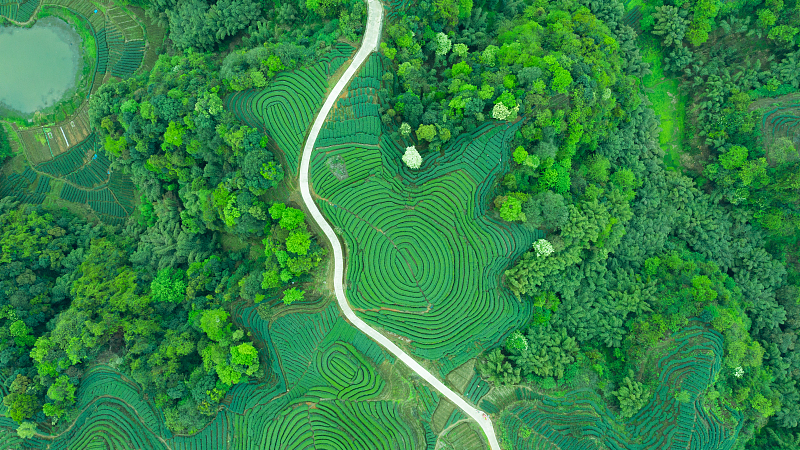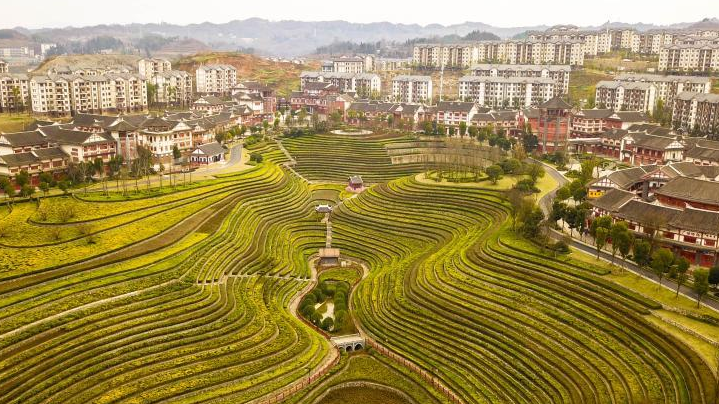
A tea mountain scenery of Shuanghe town in China's Anhui Province. /CFP
A tea mountain scenery of Shuanghe town in China's Anhui Province. /CFP
Editor's note: Alexander Ayertey Odonkor is an economic consultant, chartered financial analyst and chartered economist with an in-depth understanding of the economic landscape of countries in Asia and Africa. The article reflects the author's opinions and not necessarily the views of CGTN.
Not long ago, a study outline on President Xi Jinping Thought on Ecological Civilization was jointly published by the Xuexi Publishing House and People's Publishing House, a widely read book, distributed in China – with 10 chapters and totaling 51,000 Chinese characters in the text.
The book, compiled by the Publicity Department of the Communist Party of China Central Committee and Ministry of Ecology and Environment, reflects Xi Jinping Thought on Socialism with Chinese Characteristics for a New Era in the realm of ecological civilization – China's development concept that has yielded enormous environmental, social and economic gains in recent years – a push for balanced and high-quality development has benefited China and our world.
Accordingly in a world where for so long, economic growth has been pursued, largely at the expense of the natural environment, and countries are more focused on their respective domestic challenges. Nonetheless, China has emerged as an important nation with an all-embracing vision to protect the global future – a guide that has yielded a colossal global impact in recent times.
Through the ecological civilization, a framework enshrined in the country's constitution, which makes provisions for adjustments for addressing global challenges – prioritizing balanced and sustainable development, including the peaceful coexistence of humanity and nature. China has sought to balance sustained economic growth, protect natural environment, and boost the harmonious coexistence between humanity and the natural environment – an impressive feat that presents the country as a unique example of how to balance economic growth and protect nature.
Data from the World Bank show that in the past four decades, China's remarkable economic growth has lifted about 800 million people from extreme poverty, contributing nearly three-quarters of the global poverty reductions over the same period. This accomplishment is never-before-seen in the history of poverty eradication in the world, especially under such a limited timeframe.
Beijing was not tempted to solely pursue this goal at the expense of the natural environment – the leadership of the country has adhered to the trajectory of an ecological civilization by bolstering the nation's forest cover, which has paid off immensely.

A newly built community for poverty alleviation relocation at the ancient township of Shexiang in Dafang County, southwest China's Guizhou Province, December 24, 2020. /Xinhua
A newly built community for poverty alleviation relocation at the ancient township of Shexiang in Dafang County, southwest China's Guizhou Province, December 24, 2020. /Xinhua
Data from the Food and Agriculture Organization of the United Nations disclose that between 1990 and 2020, China's development in terms of increases in forest cover stands out among the 236 countries and territories – China accounted for close to one-third of the rise in the global area of planted forests, and contributed almost two-thirds of Asia's combined total for the aforementioned period.
China's extensive forest cover has reversed deforestation via huge investments – the country experienced an increase in forest cover from 157 million ha in 1990 to 220 million ha in 2020 and a growth in the share of forests from 16.4 percent in 1990 to 22.9 percent in 2020. By balancing economic growth and protecting forests at the same time, China has made remarkable gains in harmonizing the coexistence between nature and humans.
The forests, known to provide habitats for ecosystems, protect soil and conserve water together with offering other crucial services to society and economies when they are healthy, are supporting the well-being of the Chinese. The country's extensive gains in forest cover have contributed to reducing air pollution, and creating a healthy environment. This transformation has led to a dramatic drop in deaths caused by air pollution.
According to the University of Chicago's Energy Policy Institute, between 2013 and 2020, particulate matter in the air in China declined by 40 percent, contributing in reducing the global smog level, an accomplishment that took the United States three decades to attain. But China had achieved this target in only seven years.
China's strict adherence to an ecological civilization has proven to be very effective at addressing global challenges, showing a Chinese solution to sustainable development.
Additionally, this splendid achievement has not been a fluke. China's approach to an ecological civilization has been systematic, since it engages all relevant stakeholders, to set defined goals and to remain committed to addressing the pressing challenges within the scheduled timeframe – leveraging research and development to produce innovative technologies and equipment for a clean energy transition, protecting biodiversity, recycling, reducing waste and conserving water, which has benefited China and the world, delivering a powerful signal that an ecological civilization is protecting the global future.
(If you want to contribute and have specific expertise, please contact us at opinions@cgtn.com. Follow @thouse_opinions on Twitter to discover the latest commentaries in the CGTN Opinion Section.)

